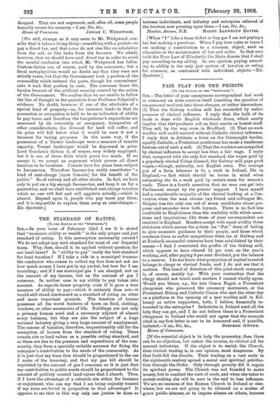FAIR PLAY FOR THE PRIESTS.
[To THR EDITOR OF TER "EPECTATOR."1 SIR,—The letter of your anonymous correspondent last week in comment on mine resolves itself (omitting the question of my personal motives) into three charges, or rather innuendoes. (1) That the Galway woollen mill has succeeded by unfair pressure of clerical influence. I reply that the bulk of its trade is done with English wholesale firms, which surely implies that thel products sell on their merits as honest stuff. They sell, by the way, even in Bradford. (2) That no such woollen mill could succeed without Catholic clerical influence. I reply that in Athlone, a town on the Connaught border, equally Catholic, a Protestant gentleman has made a handsome fortune out of such a mill. (3) That the workers are compelled by clerical influence to accept less than a fair wage. I reply that, compared with the only fair standard, the wages paid by a popularly elected Urban Council, the Galway mill pays good wages,—though, naturally, not English rates. The average pay of a farm labourer is 95. a week in Ireland, 18s. in England,—a fact which should be borne in mind when estimating the Gs. a week paid by certain nuns for women's work. There is a fourth assertion that no man can get into Parliament except by the priests' support. I have myself had a considerable majority of the clerical backing at a Con- vention when the man chosen (my friend and colleague Mr. Halpin) was the only one out of seven candidates whose pro- poser and seconder were both laymen. There is no fact less creditable to Englishmen than the credulity with which asser- tions and imputations like those of your correspondent are received in England. Readers accept with equal avidity those strictures which accuse the priests (as " Pat " does) of failing to give economic guidance to their people, and those which condemn them as unfair competitors when (as at Galway and at Foxford) successful ventures have been established by their means.—I find I overstated the profits of the Galway mill, which appears to have cleared 12 per cent, on the year's working, and, after paying 8 per cent. dividend, put the balance to a reserve. I do not know what proportion of capital invested belongs to clergy or clerical funds, and I do not see that it matters. The board of directors of this joint-stock company is, of course, mainly lay. With your contention that the clergy should not touch such matters I cannot wholly agree. Would you blame, e.g., the late Canon Bagot, a Protestant clergyman who pioneered the creamery movement, or the Protestant Bishop and Catholic Canon who met the other day on a platform at the opening of a new woollen mill in Kil- kenny as active supporters, both, I believe, financially in- terested in the enterprise ? Industries in Ireland need all the help they can get, and I do not believe there is a Protestant clergyman in Ireland who would not agree that the example cited in my first letter is one to be honoured and, if possible,
[If the essential object is to help the peasantry, then there can be no objection, but rather the reverse, to clerical aid for nascent industries. If the object is to enrich the Church, then clerical trading is, in our opinion, most dangerous. By that fault fell the Jesuits. Their trading on a vast scale in the eighteenth century spread a moral and spiritual petrifac- tion through the Order. Only through poverty did it regain its spiritual power. The Church was not founded to make money, but to conduct the cure of souls, and when she takes to money-making she will be sure in the end to lose influence. We are no enemies of the Roman Church in Ireland or else- where, but we are not going to be silenced on a matter of grave public interest, or to impose silence on others, because
Mr. Gwynn threatens us by implication with an accusation of being intolerant and credulous prieet-haters.—En. Spectator.]











































 Previous page
Previous page